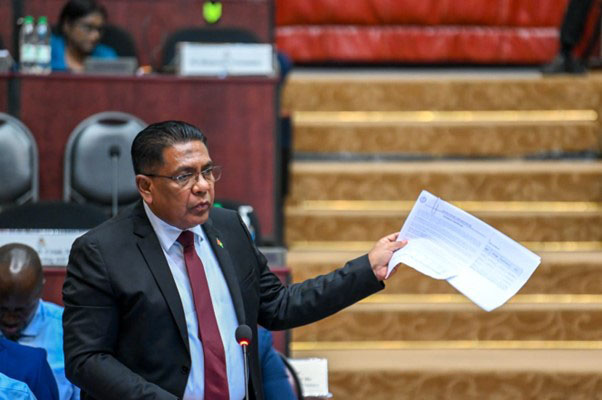-MPs clash over sugar, rice industries
Just over $40.7b in supplementary financing was approved by Parliament after around 10 hours of debate yesterday and there were clashes over several of the items particularly for the sugar industry
The two sides argued over contingency funds equalling $4.57 billion intended for the agriculture sector during the 85th Sitting of the National Assembly at the Arthur Chung Conference Centre. The Government requested that amount to cover expenses from April 1 to July 30, 2024, in a bid to stabilize the rice and sugar industries.
Stabroek News on Wednesday reported that GuySuCo registered whopping losses of $7.8 billion in 2021 and $10.2 billion in 2022. Further, this year it had the worst-ever first crop. Despite setting an ambitious target of 100,000 tonnes for the year, insiders suggest that even a strong second crop may not suffice to meet this goal.
Defending the request from the Contingency Fund, Agriculture Minister Zulfikar Mustapha also addressed concerns about the reopening of GuySuCo estates and financial management. He noted that the Albion estate has faced electrical issues, while the Rose Hall estate processed over 2,000 tonnes of sugar, generating revenue at the average price of US$750 per tonne. Despite ongoing financial difficulties, Rehabilitation efforts include a $600 million investment to repair the Albion factory powerhouse.
The Guyana Rice Development Board, another crucial player in Guyana’s agricultural arena, has been plunged into financial difficulties due to a temporary 25% reduction in commission rates designed to aid millers during the COVID-19 pandemic. This move, intended to stabilize paddy prices, has instead led to a severe financial shortfall, with the GRDB having to forgo its commission entirely. Paddy prices surged from $4000 to $4500 per bag between April and August 2024, exacerbating the GRDB’s financial strain.
As the GRDB scrambles to restore its finances, questions were raised by the opposition. “Why was $524 million suddenly needed and not in February’s budget?” Opposition MP Vinceroy Jordan demanded answers, questioning the unexpected financial strain and the GRDB’s ability to manage its growing staff of 250. Mustapha attributed the crisis to unforeseen challenges, including a new paddy bug threat and complications from El Niño.
With rice production holding steady, up from 610,000 tonnes to 653,000 tonnes, the sector appears resilient despite mounting issues, according to Mustapha. Yet, rising prices for white and brown rice are fueling opposition concerns. Mustapha said that the increases are market-driven rather than supply-related, insisting that the government cannot enforce price controls on supermarkets.










